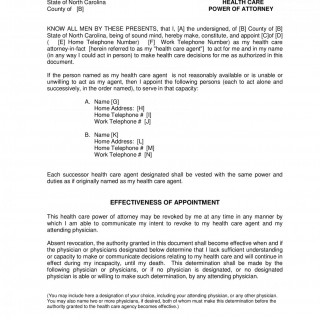HealthCare Power of Attorney
A Health Care Power of Attorney is a document that allows you to designate a person - "Agent" who will have the authority to make health care decisions on your behalf if you are unconscious, mentally incompetent, or otherwise unable to make such decisions. In many states you can also express your wishes regarding whether you wish to receive "life-sustaining procedures" if you become permanently comatose or terminally ill, in the Health Care Power of Attorney document. This will help your agent to know your wishes as he or she makes decisions for you. Even if you do include this in the document, you should still discuss the Health Care Power of Attorney with the Agent, expressing your wishes, values and preferences regarding health care.
The purpose of health care power of attorney is to give the person you designate (your “agent”) broad powers to make health care decisions for you, including power to require, consent to or withdraw any type of personal care or medical treatment for any physical or mental condition and to admit you to or discharge you from any hospital, home or other institution. This form does not impose a duty on your agent to exercise granted powers; but when powers are exercised, your agent will have to use due care to act for your benefit and in accordance with this form and keep a record of receipts, disbursements and significant actions taken as agent. A court can take away powers of your agent if it finds the agent is not acting properly. You may name successor agents under this form but not co-agents, and no health care provider may be named. Unless you expressly limit the duration of this power in the manner provided below, until you revoke this power or a court acting on your behalf terminates it, your agent may exercise the powers given here throughout your lifetime, even after you become disabled.
A Health Care Power of Attorney - also known as a Durable power of attorney for health care - can be helpful when you're unable to make medical decisions for yourself.
Unlike the living will - which usually is limited to terminally ill patients - this document applies whenever you're unable to make medical decisions, such as when you're temporarily incapacitated or seriously ill.
When choosing someone to be your health care power of attorney, you'll want someone who:
- Basically agrees with your views and whose judgment you trust
- Can stand up for your preferences
- Can talk comfortably with doctors
It's also a good idea to name an alternate, in case your first choice isn't available.
You may have specific wishes you want to spell out for your family. For example, you might:
- Prefer to use hospice care if you're close to dying
- Have religious objections to certain medical treatments
- Have an illness and want to clarify what sort of end-of-life medical treatment you'd prefer - or want to refuse.
Your quality of life may deteriorate to the point where some would consider it worse than death. Some people would not want aggressive medical treatment if they were permanently unable to communicate, for example, or if they had a long, chronic illness with serious side effects. Some folks don't want to be resuscitated or kept alive if they ever suffer from severe dementia, such as advanced Alzheimer's disease or a severe brain injury.
If you feel this way, say so in your health care power of attorney - and explain your views to your family, too.
A Health Care Power of Attorney is different from a Living Will because it allows you to appoint someone to make health care decisions for you. A Living Will only allows you to express your wishes concerning life-sustaining procedures.
Both Living Wills and Health Care Powers of Attorney are considered "Advance Health Care Directives" because you're giving instructions on what you'd want to happen in the event that you become unable to make health care decisions in the future. Some states also have a specific "Advance Health Care Directive" document that combines elements of a Health Care Power of Attorney and a Living Will. (For a more in-depth look at Advance Health Care Directives, Health Care Powers of Attorney and Living Wills, click here.)
Even if you have executed a Health Care Power of Attorney, you still have the right to give medical directions to physicians and other health care providers as long as you are able to do so. This document only becomes effective when you do not have the capacity to give, withdraw or withhold informed consent regarding your health care.

